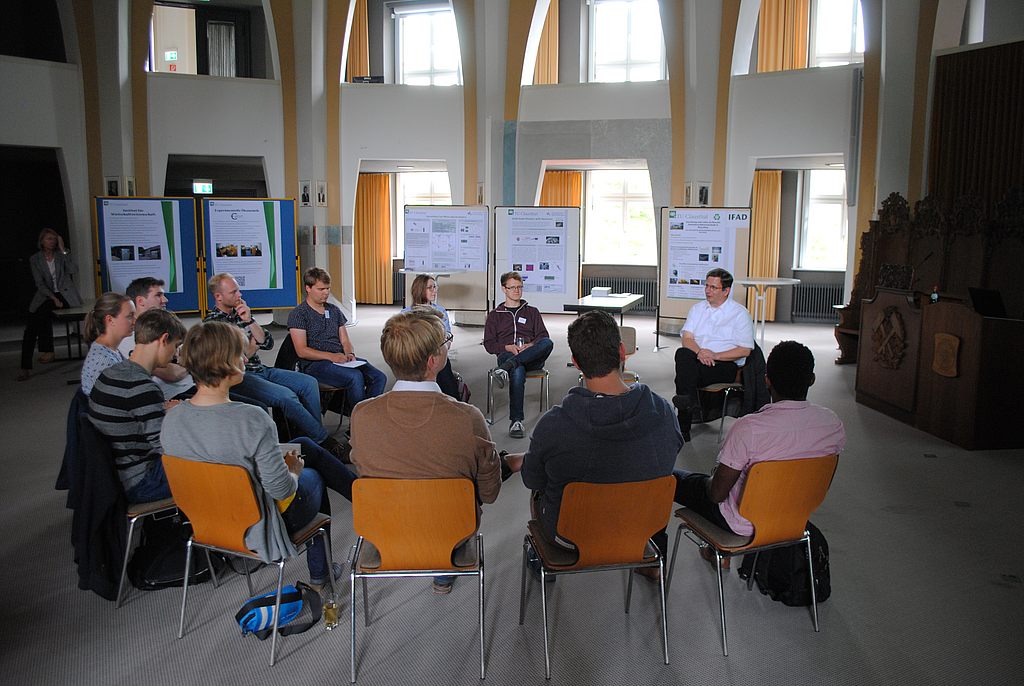Dr. Patrick David
Dr. Patrick David
What did you study?
I have a degree in computer science.
In which subject area did you do your doctorate and what did you research?
I did my doctorate in fatigue strength (mechanical engineering). I analyzed the stresses on wheelset shafts (i.e. "railroad axles") on commuter trains.
What is your current job like?
I work in the fatigue strength department at Audi. There I look after software in the vehicle to determine stresses in the car - so I can combine the two areas of computer science and operational stability.
Did you spend any time abroad during your studies or doctorate?
No. Of course I was also asked this question when I applied to Audi. I answered it truthfully: If I had gone abroad for a semester, the children's Aikido group I was leading would have been lost. It wasn't worth it to me, so I set priorities.
Did you do any (voluntary) work on the side?
Yes, I was active as the leader of a sports group (Aikido) for children and adults for the entire duration of my studies and doctorate and therefore worked as a sports teacher 4-5 times a week. Apart from a short break when I moved from Clausthal to Ingolstadt, I still do this today.
Did you take part in interdisciplinary training programs?
Yes, but not during my studies. I've been doing this regularly since I joined Audi.
What language skills do you need in your job today?
At the beginning, only German. But the Volkswagen Group has now also moved into international business and I have to speak fluent English (which fortunately isn't a major problem for me). You learn the missing technical English on the job anyway.
Did you already gain practical experience during your apprenticeship?
Depends on the definition. I already worked as a research assistant at the IMAB (Institute for Mechanical Plant Engineering and Structural Durability) during my studies in computer science (software development). As a computer scientist, I had a lot of creative freedom, but few like-minded people in this environment with whom I could exchange ideas. In this respect, I gained a lot of practical experience. However, I was not employed outside the TUC.
By the way: When I applied to Audi, my doctoral period was (partly) counted as practical experience, as I didn't just work on research projects at the IMAB, but also on a lot of industrial contracts.
What did you benefit from most in your job?
Structural durability is a rather exotic field. That's good for me, of course, as there are relatively few experts in this field. That's why it didn't matter at all that I did my doctorate in the rail sector and now work in the automotive industry.
As a computer scientist in the engineering world, the water was very cold at first. I had no idea about the simplest things (for engineers), I couldn't even read a technical drawing. So I was the clueless one in the circle of the enlightened. What did I learn? You can learn anything! Don't let it get you down, ask questions that make everyone in the room roll their eyes! Everyone thinks you're stupid? Put up with it! Keep asking questions until you understand. You can get to grips with anything, that's exactly what you learn at university.
...and by the way: being able to program helps in EVERY field these days!
What do you need in your job today that you didn't learn during your studies/doctorate?
Let's put it this way: during your studies and doctorate, you are a lone fighter for long stretches. Today, I work in a large corporation with many employees who have a secure job and a fixed employment contract. It's almost impossible to avoid someone if you need them professionally. That's why one of the most important skills is Learn how to get along with people. Even (or especially) with those who are not on your wavelength. It doesn't matter whether you like them or not - you have to work with them to get the best out of the project. Learn to deal with all people - regardless of origin, cultural background, educational level, political opinion, etc. Motivate them to work with you. Be courteous, treat everyone with respect and never play the "it's not my problem" card. It comes back like a boomerang.
Is there anything you would like to pass on to our graduates?
When I look at applicants and evaluate whether they are a good fit for us, grades are of secondary importance to me personally (note: there may be a pre-screening process in which grades play an important role). An applicant has to convince me that he/she is willing to learn and fits into the team as a person - in other words, that he/she is simply okay. I value life experience and a change of perspective. Anyone who has found their way in many (life) situations in the past will also do well in the job. Anyone who is permanently committed to one area (for me it's Aikido, but the specific area doesn't matter) and can withstand ups and downs has shown stamina. I've also had applicants who had to care for relatives or accompany them until they died. These people were much more far-sighted at a young age than many of their fellow applicants - that is also experience. Bring that into the interview.
